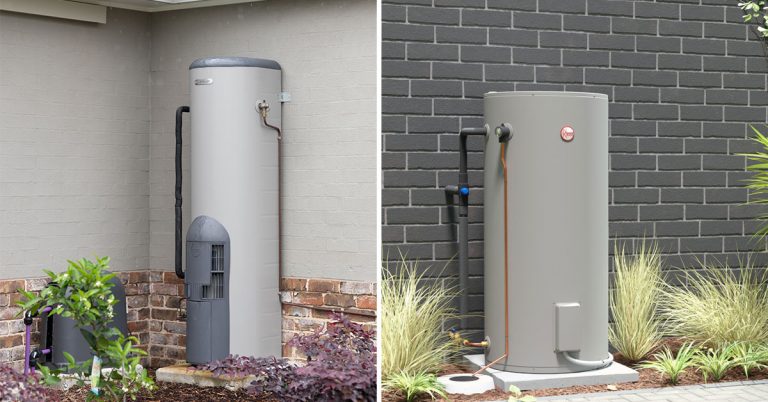Electric and gas hot water systems are two of the most common ways to heat water. Both are relatively inexpensive in terms of up-front costs, and they provide a reliable supply of hot water for showers, washing and other household tasks.
If your old electric or gas water heater is showing signs of wear or has stopped working, it may be quick and easy to replace it like-for-like. However, before you do, it is important to consider a few key factors that could help reduce your energy consumption.
1. Like-for-like electric water heater replacement
You can replace your current electric water heater with another, which could help you save on installation costs and have you back in hot water fast.
Also, if you’re connected to “off-peak” (sometimes called overnight rate) or “time of use” tariff (and set the timer so it only heats in the “off-peak” period), this will help keep your running costs down.
2. Like-for-like gas water heater replacement
Replacing an old gas water heater with a newer model can help you reduce your energy consumption. Rheem’s range of energy-efficient 4-star and 5-model gas models cost less to run than older 3 Star models. As a guide, every extra energy-rating star represents approximately 7% less gas usage¹.
3. Can you replace an electric water heater with an energy-efficient gas model?
If you have an electric water heater but an energy-efficient gas water heater sounds appealing, you could potentially be able to replace your old electric with gas.
However, there are a couple of things you need to consider if you’re looking at gas as a water- heating option:
- Determine whether you have gas piping in your Your local energy provider can advise if gas is available and arrange connection²; and
- If you already have gas for cooking or heating, your plumber can advise on the best way to install a gas water heater, including where the water heater is placed and whether another gas line is required.
If gas is not available in your home or street, you can install a propane (also known as LPG) gas water heater, which can be run from refillable gas bottles³. Generally speaking, this tends to be less economical so be sure to speak to your plumber and energy provider who can advise what will be involved.
Gas water heaters come in two forms – storage and continuous flow – each with their benefits. For more information on the difference between gas storage and gas continuous flow, read our dedicated article here
4. Have you considered a renewable replacement option for your gas or electric water heater?
With gas and electricity prices on the rise, it is a good time to consider switching to a renewable option for water heating. Choosing a solar or heat pump hot water system can help reduce your energy consumption, which may make a difference to your savings as hot water can contribute up to 25% of an Australian household’s energy bill⁴.
Solar hot water
Installing solar hot water is one of the simplest ways to reduce your energy consumption, as well as carbon emissions, contributing to a sustainable future. In fact, switching from an electric water heater to solar could save you up to 65% on your water-heating energy consumption.⁵
Plus, you can take advantage of government incentives known as Small-Scale Technology Certificates (STCs) to reduce the upfront cost of switching to solar. There are also state based incentives available in the form of ECS’s in NSW and VEECs in Victoria.
If you have no hot water and don’t have time or money to spend on a solar water heater, you can opt for a Rheem Solar Ready electric water heater. This will get you back in hot water fast and future proof your investment by allowing you to upgrade to a full solar hot water solution when you’re ready.
Talk to your local Rheem Solar Specialist about Rheem Solar Ready Electric Water Heater and upgrade to solar.
Heat pump water heater
If you’re considering solar but not sure it’s right for your home a heat pump water heater may be the answer. A heat pump uses the ambient heat from the surrounding air to heat your water.
Also, it has a similar storage tank to an electric water heater, and often uses the same electrical connection and plumbing connections, so replacement is quick and easy.
The Rheem AMBIHEAT Heat Pump is a smart, energy-efficient and cost-effective approach to water heating that can help you save up to 73%⁶ on your water-heating energy consumption. STCs also apply to heat pump water heaters.
For more information on the difference between solar and heat pump hot water systems, click here
After More Information?
If you are looking to replace your electric water heater and wish to explore your options, contact Rheem or ask your local plumber today.
Disclaimers:
- According to the gas code AS/NZS 5263.1.2, the star rating is based on a reference heater 30MJ/h, 140L capacity, 70% thermal efficiency, maintenance rate 14MJ/h and an annual energy consumption 28,900MJ. The energy saving for each star better than the reference heater is 7%: 3 stars 14%, 4 stars: 21%, 5 stars: 28%.
- There will be costs associated with this and you may need to arrange contractors to complete the work.
- Not all gas water heater models have an LPG Speak to your plumber on whether LPG is an option for you.
- https://energy.gov.au/households/quick-wins
- Energy savings of up to 65% based on Australian Government Approved TRNSYS simulation modelling using a medium load in Zone 3 and apply when replacing an electric water heater with a Rheem 511325/2NPT or 52D300/2NPT solar water heater in zone 3. Any savings will vary depending upon your location, type of water heater being replaced, hot water consumption and fuel tariff. The impact on an electricity account will depend on the tariff arrangement of the water heater being replaced and where you
- Energy savings of up to 73% are based on Australian Government approved TRNSYS simulation modelling using a medium load in Zone 3 and apply when replacing an electric water heater with a Rheem 551270 Heat Pump water heater. Any savings will vary depending upon your location, type of water heater being replaced, hot water consumption and fuel The impact on an electricity account will depend on the tariff arrangement of the water heater being replaced and where you live.




Comments are closed.